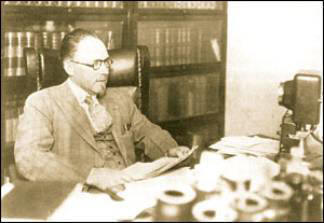
--Kansas Historical Society photo
Dr. John R. Brinkley
eclectic ‘charlatan’ sold rejuvenation and religion
Q: What's the fastest thing on
four legs?
A: A goat passing Dr. Brinkley's hospital!
-Contemporaneous joke.
By TOM W. DILLARD
Arkansas Democrat-Gazette, January 26, 2003
|
A |
friend recently called and asked if I’d ever heard of a “Shriner Country Club” in Little Rock. Certainly, I answered, and what an amazing history it has. Located several miles south of Little Rock on Arch Street Pike, the large stone structure was built in the 1920s by the Shriners as a country club, but it failed and now it is a Roman Catholic Carmelite Monastery. Visiting the pastoral site today one would never suspect that between the Shriners and the Catholics, the building was owned by one of America’s most famed medical quacks, Dr. John Richard [or Romulus – he claimed both middle names] Brinkley.
Born into a North Carolina family of modest means in 1885, young John worked at a variety of jobs, all the time consuming a strange combination of books on home medical treatment and theology. In 1907 he married and began practicing medicine as a “Quaker doctor,” whatever that was. He then relocated to Chicago where he studied at Bennett Medical College, a school for “eclectic” physicians. The hapless Mrs. Brinkley got a divorce in 1913, after giving birth to four children in less than six years. Immediately remarrying, Brinkley began practicing in South Carolina as an “Electro Medic Doctor.” After spending a while in jail for failure to pay his bills, Brinkley relocated to Judsonia in White County, Arkansas, where he had a successful practice. But, he had much grander dreams.
In 1915 Brinkley graduated from Eclectic Medical University in Kansas City, Mo., a diploma mill recognized by only eight state medical boards, including that of Arkansas. After being licensed here, he soon left the state for Kansas, arriving in the little village of Milford with $30 in his pocket, a medical bag, a Saxon automobile and his new wife, Minnie Telitha Brinkley. Now his life really got interesting.
Whatever Brinkley lacked in medical skill, he made up for in innovation and bravado. Realizing that impotent men would pay any price to have their sexual vigor restored, the new Kansas doctor developed a surgical procedure he called the goat-gland operation by which he transplanted goat gonads into “tired men.” Many of his customers were quite satisfied with the procedure, and soon Brinkley built his own hospital and a string of drugstores. And for good measure, he acquired a radio station. Brinkley used his radio station to sell a mixture of fundamentalist religion and sexual rejuvenation, prompting one historian to quip that the doctor transformed the three R’s into radio, rejuvenation and religion. As many evangelists have discovered, the radio proved to be an easy way to riches. In 1930 Brinkley’s world came crashing down when the Federal Communications Commission closed his radio station and the Kansas medical authorities revoked his license. He immediately began a campaign for Kansas governor as a write-in candidate and came close to winning. Brinkley was anything but a quitter, so he purchased a radio station in Villa Acuna, Mexico, just across the Rio Grande from Del Rio, Texas. With a huge transmitter, the station could be heard across North America, drawing thousands of patients to Brinkley’s new hospital in Del Rio. Though Brinkley discontinued his goat gland operation while in Del Rio, he developed a prostate operation that was popular even though it was nothing more than a dressed up vasectomy. He reportedly earned $8 million during his Del Rio days. The arrival of a competitor, who performed the same operation at a discount, drove Brinkley from Texas to Arkansas, though he kept his residence in Del Rio and his Mexican radio station. He established a hospital in the old St. Luke’s Hospital at 1924 Schiller, adding a Romulus Drug Store nearby. Though he operated in the Schiller Street hospital, he established a convalescence facility at the old Shriner Country Club, christening it the Brinkley Country Club Hospital.
Things went smoothly for a while, but Brinkley’s luck ended when Dr. Morris Fishbein of the American Medical Association included him among a list of modern medical charlatans. Brinkley sued for libel, and at the trial in Del Rio, Fishbein turned the tables on his accuser by maintaining that he could not be convicted of libel since his charges were true. The courts agreed, and soon Brinkley faced a string of civil suits. In 1941 he declared bankruptcy. This was followed by federal indictments for mail fraud. Brinkley never came to trial. He died in his sleep in May 1942. Neither he nor the goats died in vain, however, for all the scandals surrounding Brinkley forced the Arkansas legislature to adopt laws regulating the practice of medicine.